The future belongs to cryptocurrency, and if you are a crypto holder, you might know the importance of a crypto wallet. The number of crypto users has increased significantly in recent years, creating ample business opportunities for you. This is why it’s the ideal time to invest in a wallet based on blockchain technology for your platform. But, are you pondering on the development process for a cryptocurrency wallet?
This article outlines a guide to the wallet development process, wallet types, essential features, pitfalls, market overviews, and more. Let’s start!
What Is A Cryptocurrency Wallet?
A crypto wallet enables you to save and access your digital currency safely. It stores the public and private keys necessary for exchanging cryptocurrencies and keeping track of the crypto balance. It’s a platform for keeping tabs on, trading, and transferring digital money (Crypto tokens).
The security of their digital currencies is improved with a digital wallet. Every time tokens are sent to the wallet, control of those tokens is transferred to the wallet’s address. This wallet might be physical, digital, portable, or installed on a computer.
The Functioning Of Crypto Wallets Is As Follows:
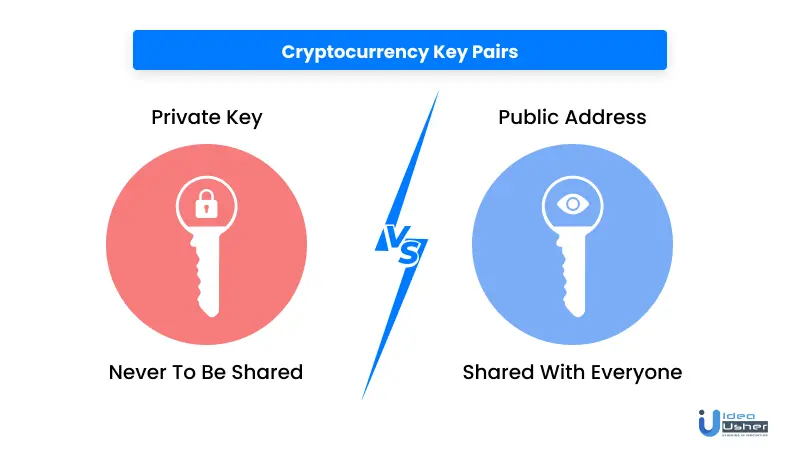
If you want to buy something with crypto, you’ll need your public key, often known as your wallet address, and your private key.
- Similar to a bank account number, a public key identifies you. If you want to transfer or receive money from other people or organizations, all you need is their bank account number. The public key may be the address of your digital wallet, and unlike the private key, it can be shared.
- Your crypto wallet’s private key is just as confidential as the password to your bank account or the PIN to your debit card. Disclosing your personal identification number (PIN) to a third party would provide them immediate access to your financial statements, so you should be careful about who you say—a private key acts like a password to your digital currency.
To receive digital currency from a third party, you must provide them with the private cryptographic address that was generated for your wallet. Consequently, your crypto does not physically reside within the digital wallet but within the blockchain. Due to the absence of a tangible cryptocurrency token, your ownership interest in the digital currency is represented by the public and private keys that are stored in your crypto wallet. You may transmit and receive crypto while protecting your private key with the aid of these two keys.
Steps To Follow For Cryptocurrency Wallet Development
With adequate planning, you may develop a crypto wallet app that will gain widespread popularity.
1. Understand Blockchain And Crypto
It would be impossible to create a cryptocurrency wallet without the use of blockchain technology. Understand blockchain technology and digital currencies before initiating cryptocurrency wallet development.
Like the internet enables web surf, blockchain technology promises to revolutionize how digital currencies (cryptocurrencies) function. A blockchain, as its name indicates, is a series of linked blocks, each of which stores some digital information (data). The blocks are linked using a cryptographic technique known as a chain. With its help, sensitive information may be sent safely and effectively.
2. Use Standard Cryptocurrency Open-source Libraries
Almost all digital currencies use public source code. Thus, there is no need to start from scratch. Free libraries and tools, such as BitcoinJ SDK and Coinbase SDK, are available for usage.
- The Coinbase SDK is a Java library that works on all platforms. It provides guidance for making an iOS and Android bitcoin wallet. And this library works with a wide variety of languages, like Python, Java, Ruby, etc.
- BitcoinJ SDK is well-documented and simple to use. On top of that, BitcoinJ is JVM-compatible, so that you can use the JVM’s languages like C++, JavaScript, Ruby, Python, etc.
3. Use APIs
Developing a robust digital wallet app is a breeze when you use APIs. Using a distributed ledger application programming interface (API), you can quickly sync your digital wallet with the blockchain ecosystem. Coinbase, Bitcore, SimpleSwap, and Factom are four of the most widely used application programming interfaces (APIs).
4. Use The Cloud
It is now time to decide which cloud services best support your project.
- To build a web app, you may use PaaS (Platform as a Service).
- On the other hand, if you want to build a crypto wallet app, you’ll need to find a BaaS (Blockchain as a Service) provider and include their cloud service. Providers of BaaS solutions include industry giants like Amazon, Azure, and Microsoft.
Either one may be used to create a dedicated digital wallet app; which one you use will depend on your specific needs and preferences.
5. Technology Stack
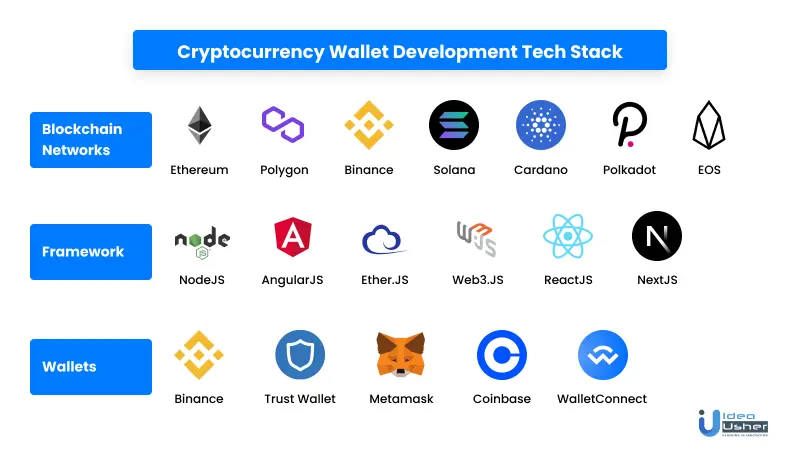
To ensure your app’s success, you must choose the appropriate technological stack.
- Node.js and Angular.js are two popular options for developing web applications.
- These may be used with HTML5 and CSS3 to create a powerful and flexible platform. You may use this to make a secure web application with this.
- You may use either Java or Kotlin to create a native Android app.
- And both Swift and Objective-C may be used to build iOS apps.
6. Enhance Security
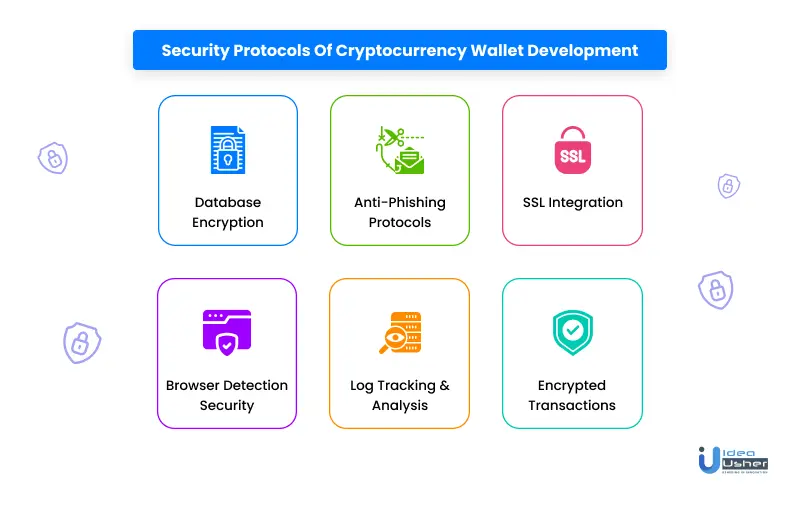
When developing a digital wallet application, safety must be your first priority. Because of this, you need to be sure that your crypto app has the highest level of protection.
Two-factor authentication (2FA) in the form of fingerprint, face ID, or hardware authentication can be considered an additional safety measure for the crypto wallet app.
The developers have an obligation to provide constant security patches. If there are any bugs or security flaws, they need to be found and fixed as soon as possible utilizing cutting-edge tools.
7. Research Your Competition
No doubt, you’d like your wallet app to stand out from the others. That’s why you must monitor the activities of your competition.
- Familiarize yourself with their processes and the technology they’ve implemented.
- Identify the available options to discover what unique features your app can have.
- Keep in mind that staying abreast of current events is essential to maintaining an advantage over your rivals.
8. Develop Your App
So, when you’re ready to begin the development of your cryptocurrency wallet, make sure you:
- Make a decision on what functions will be included in your app.
- Produce the program code and connect it to your database.
- Make the UI easy to understand and utilize.
- Before releasing your wallet to the public, be sure it has been through rigorous testing.
Top Features To Include In Your Wallet App Used By Most Popular Crypto Wallet Applications.
1. User Authorization
Integrate a two-factor or multi-factor authentication system into your crypto wallet app (2FA or MFA). It’s like an extra safeguard for your information.
2. QR Code Scanner
Including a QR Code Scanner in your digital wallet is a great way to improve its speed, convenience, ease of use, and safety. It can make it possible for public keys and wallet addresses to be scanned automatically.
3. Multiple Cryptocurrencies
Since new cryptocurrencies are constantly being introduced and the prices of existing ones are often fluctuating, your wallet will need to be able to store more than one type of cryptocurrency. Your crypto wallet app must support effortless cross-currency transactions.
4. Paper Wallet Import
It is essential that your app’s users can utilize the QR code scanner to access their paper wallets for transferring and receiving cryptocurrency.
5. Notifications
You may notify and alert users of cryptocurrency transactions and other relevant information via push notifications.
6. Latest Conversion Rates
Make it possible for your customers to view and adjust transaction costs depending on the constantly fluctuating exchange rate.
7. Transactions Using Blockchain Technology
Your crypto app should make it easy for users to send and receive digital currency in a way that is both secure and quick.
8. Address Management
With this function, your customers will have a centralized location from which they can manage all of their commonly used addresses, streamlining the transaction process and saving them time.
9. Payment Gateways
Your app’s users can buy and trade virtual goods more quickly if you include a payment gateway.
10. Session Logout
This is a fantastic addition to your app’s safety features. With this setup, users who haven’t interacted with the app in a while will automatically log out.
Cryptocurrency Wallet: Market Overview
| Estimated Market Size (2022) | US$ 1,398.2 Mn |
| Projected Market Valuation (2032) | US$ 3,371.3 Mn |
| Value-based CAGR (2022 to 2032) | 9.2% |
| YoY growth (%) | 16.23 |
While concerns like misuse and security threats limit the acceptance of cryptocurrencies and may restrict market growth, the preference of the people for digital money is a major driver of the growth of the crypto wallet industry.
- The increasing popularity of digital currencies is helping to fuel the need for crypto wallets.
- The proliferation of digital wallets is a factor that will drive the global cryptocurrency wallet industry forward.
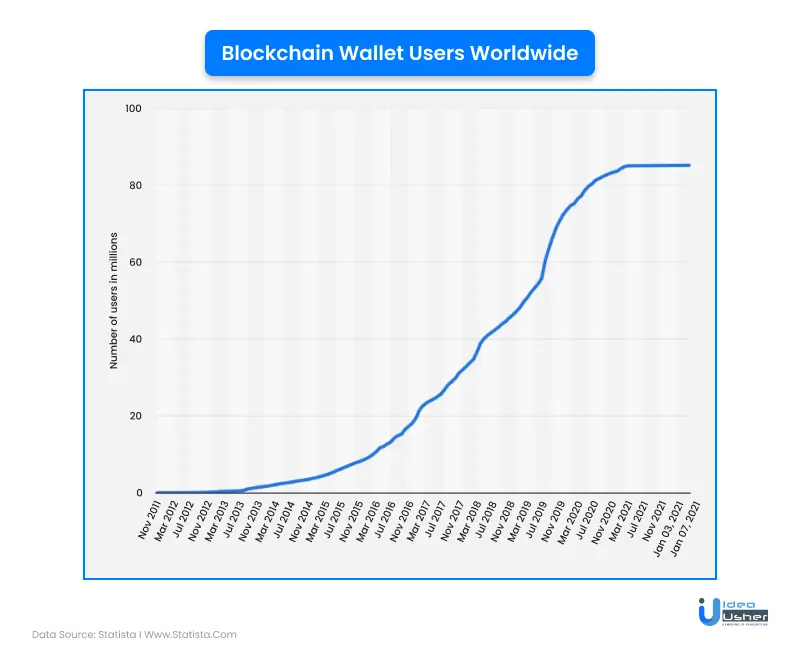
Using Blockchain technology, crypto wallets provide you a number of options, and the speed and security of your transactions is unparalleled. There has been an incredible increase in the use of Blockchain wallets over the past several years. The graph above indicates that by 2021, there were over 68 million wallet users, and that figure has only risen from there in the following year.
Types Of Crypto Wallets
Crypto wallets are divided into “cold” and “hot” types, respectively, depending on their accessibility to the Internet.
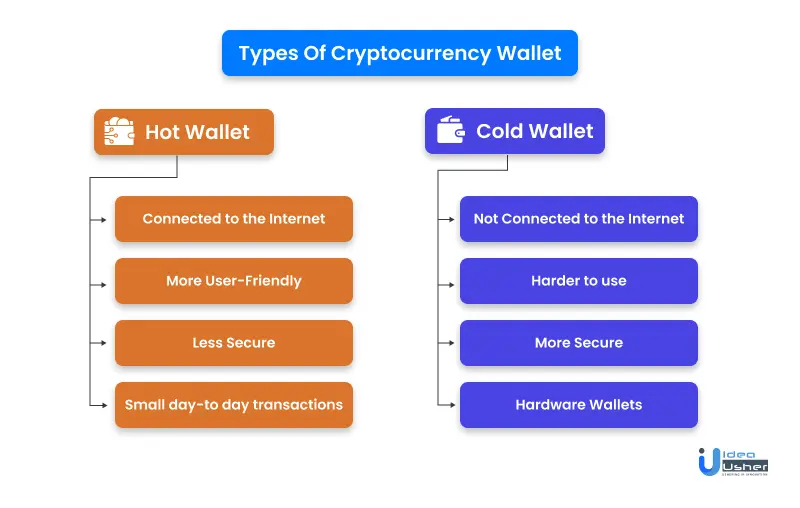
1. Cold Wallet
Those are the physical wallets available. They keep your keys on a device that doesn’t have Internet access. In-demand cold storage wallets often resemble a USB drive. Paper wallets, which involve printing your public and private key pairs onto paper, are another safe option for storing cryptocurrency offline.
If you want to keep your cryptocurrency safe, many people in the crypto community recommend putting it in cold storage. Because of this, offline wallets are the most secure option; however, they are prone to misplace.
2. Hot Wallet
These electronic wallets exist solely in the digital realm. They are more convenient than cold wallets but only partially as secure. Hot wallets are accessible through downloadable software for your computer’s desktop or mobile device app. In this context, “hot wallet” might refer to any of the following:
2.1 Desktop Wallets
Desktop wallets require a computer, such as a desktop or a laptop, to function. The device on which they were initially placed is the only device that can access them. A desktop wallet is a safe option unless your computer is infected with a virus. Developer may create a desktop wallets with Bitcoin Core, Bitcoin Knots, MultiBit, Armory, and Electrum.
2.2 Mobile Wallets
Most of the functionality included in traditional desktop wallets may also be found in mobile versions. However, touch-to-pay and near-field communication (NFC) technology streamlines payment processing in physical locations by scanning QR codes. You can find mobile wallets like Bitcoin Wallet and Hive Android, to name a couple.
2.3 Web Wallets
You may use a web wallet to store and access your digital currency anywhere you have access to a web browser or mobile device. They’re cloud-based and immensely useful. They’re particularly handy since users only need to remember one place to save their private keys: online.
2.4 Full Node Wallet
A full-node wallet stores your private keys and a complete copy of the blockchain, giving you full control over your cryptocurrency. Umbrel, Specter, MyNode, Blockcore, etc., are all examples of blockchain wallet applications or full-node wallets.
2.5 Custodial Wallet
A cloud wallet is one in which the private keys are held by a remote server rather than by the user themselves. Custodial wallets like Freewallet and BitMEX are two examples.
2.6 Network-Specific Wallet
When dealing with many tokens on a single network, these wallets are the way to go. One example of a network-specific wallet is the Free Wallet.
2.7 Coin-Specific Wallet
This wallet is ideal if you just care about storing a single cryptocurrency, as it is compatible with that coin alone. In addition to its native software, browser add-on, and decentralized service, the coinbase wallet is a popular crypto-storage solution (dApp).
2.8 Universal Wallet
These wallets allow you to store the private keys associated with many cryptocurrencies in a single location. In terms of universal wallets, Coinomi stands out for being a well-known multi-chain Crypto bitcoin wallet app and desktop wallet.
Why Is There A Need For Development Of Cryptocurrency Wallet?
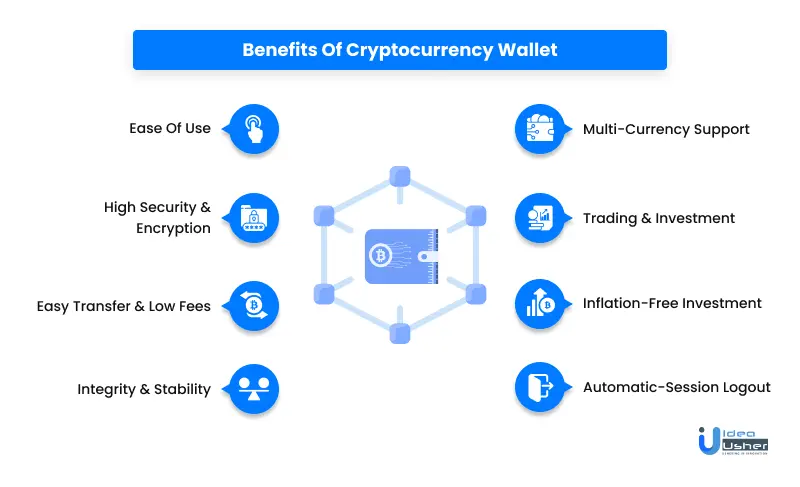
Several crucial uses for crypto wallets are necessary for the widespread adoption of cryptocurrencies. The following are some of the many cases where there is a requirement of a digital wallet:
- Controlling virtual currencies: With a crypto wallet, customers can keep track of their crypto assets’ value.
- Transactions: As a significant function, digital wallets allow users to send and receive bitcoin payments.
- Access to distributed applications (dApps): A crypto wallet the basic requirement for accessing and using decentralized applications (dApps) on Web 3.0.
- Usernames identification: Simply put, the blockchain is where all cryptocurrency data is kept. To do business on a blockchain, users need a crypto wallet that links their username to a public key address.
- Key management: In its most basic form, cryptocurrency is a public key address on the blockchain. A digital wallet is a piece of software that facilitates the safe storage and safekeeping of the secret encryption keys required to send and receive cryptocurrency.
Challenges You May Face When You Make A Crypto Wallet
In terms of business and technology, the most common challenges are:
- You need to pick which version of a blockchain your wallet will support when a fork occurs in the blockchain, which happens seldom but does need you to update your wallet.
- The need to accommodate additional currency necessitates integrating with various blockchains.
- Despite the acclaim, widespread implementation has been difficult since most consumers face several barriers at initial encounter.
- The majority of cryptocurrency items that are unsuccessful are rarely given a second shot, at least not under the same brand name.
- Finding a qualified team of developers that are equally knowledgeable about user-centered design and blockchain technology is a challenge.
Build A Powerful Crypto Wallet App With Idea Usher
A crypto wallet is the basic requirement for any and all cryptocurrency transactions. Users will be able to store, swap, and trade a wide variety of digital currencies such as Bitcoin, Ripple, Ether, etc. Get in touch with Idea Usher if you want to hire a team for your cryptocurrency wallet app development. We have extensive expertise in developing blockchain applications, years of professional experience, no hidden costs, complete transparency, and 100% guaranteed client satisfaction.
Let’s talk now!
Build Better Solutions With Idea Usher
Professionals
Projects
Contact Idea Usher at [email protected]
Or reach out at: (+1)732 962 4560, (+91)859 140 7140
FAQ
Q. How much does it cost to build a crypto wallet?
A. The cost of creating a digital wallet is proportional to the functionality you require. If you’re looking for a reasonable estimate of the time and money required to construct a wallet, feel free to get in touch with the Idea Usher team at any time.
Q. How can I make sure my wallet is safe?
A. Improve your digital wallet’s protection by taking measures such as using a multi-signature wallet, a biometric authentication system, and a password.
Q. How much is the global crypto wallets market worth?
A. At a CAGR of 9.2% between 2022 and 2032, it is the prediction that market might increase from 2021’s valuation of $1,300 Mn to $3,371.3Mn.























